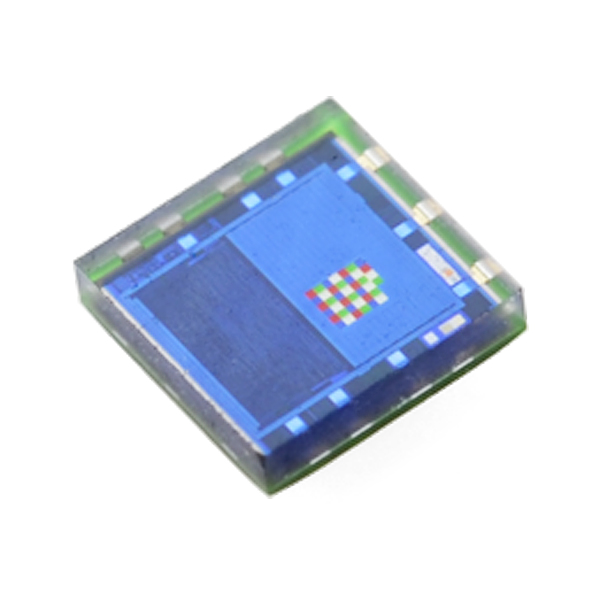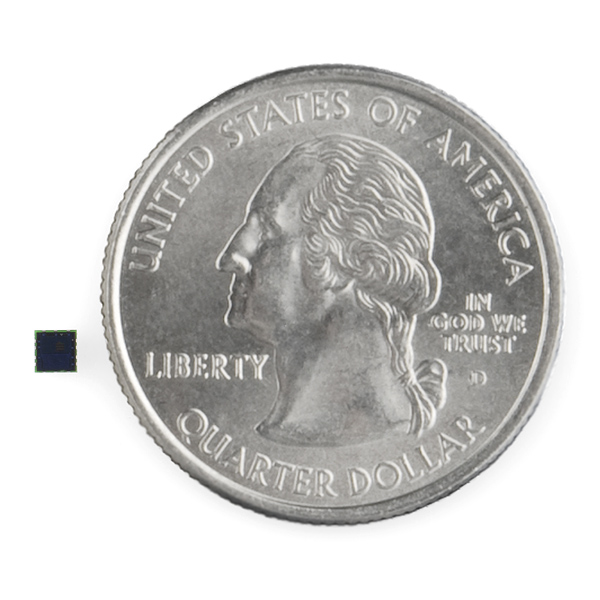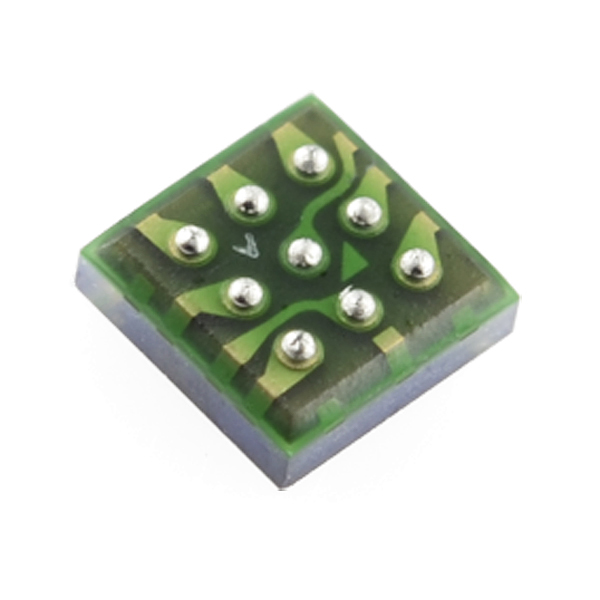×
SparkFun will be closed on Tuesday, December 24th, and Wednesday, December 25th, in observance of the Christmas holiday. Any orders qualifying for same day shipping placed after 2:00 p.m. (MST) on Monday, December 23rd, will be processed on Thursday, December 26th, when we return to regular business hours. Wishing you a safe and happy holiday from all of us at SparkFun!
Please note - we will not be available for Local Pick up orders from December 24th-December 27th. If you place an order for Local Pick-Up we will have those ready on Monday, December 30th.
Color Light Sensor - Avago ADJD-S311-CR999
We can't tell what metallic salmon looks like, but this very small sensor can! The ADJD-S311-CR999 is a 4 channel digital sensor with a mere size of . 10-bit per channel resolution means the ADJD can discern the smallest differences between visible colors. This is a CMOS IC with integrated RGB filters + Clear channel and analog-to-digital converter front end. It is ideal for applications like color detection, measurement, and illumination sensing. The 2-wire serial interface allows direct connection to a microcontroller or other logic control for further signal processing without additional component such as analog to digital converter. With the wide sensing range, the sensor can be used for many applications with different light levels by adjusting the gain setting.
Replaces:SEN-08618
- 10 bit per channel resolution
- Independent gain selection for each channel
- Wide sensitivity
- Two wire serial communication
- Built in oscillator/selectable external clock
- Low power mode (sleep mode)
- 2.2 x 2.2 x 0.76 mm
Color Light Sensor - Avago ADJD-S311-CR999 Product Help and Resources
Core Skill: Soldering
This skill defines how difficult the soldering is on a particular product. It might be a couple simple solder joints, or require special reflow tools.
Skill Level: Competent - You will encounter surface mount components and basic SMD soldering techniques are required.
See all skill levels
Core Skill: Programming
If a board needs code or communicates somehow, you're going to need to know how to program or interface with it. The programming skill is all about communication and code.
Skill Level: Competent - The toolchain for programming is a bit more complex and will examples may not be explicitly provided for you. You will be required to have a fundamental knowledge of programming and be required to provide your own code. You may need to modify existing libraries or code to work with your specific hardware. Sensor and hardware interfaces will be SPI or I2C.
See all skill levels
Core Skill: Electrical Prototyping
If it requires power, you need to know how much, what all the pins do, and how to hook it up. You may need to reference datasheets, schematics, and know the ins and outs of electronics.
Skill Level: Competent - You will be required to reference a datasheet or schematic to know how to use a component. Your knowledge of a datasheet will only require basic features like power requirements, pinouts, or communications type. Also, you may need a power supply that?s greater than 12V or more than 1A worth of current.
See all skill levels
Comments
Looking for answers to technical questions?
We welcome your comments and suggestions below. However, if you are looking for solutions to technical questions please see our Technical Assistance page.
Customer Reviews
No reviews yet.




I took a microphotograph of the sensor portion of the chip. It's pretty.
Kinda a waste of offering this as a BGA even if it was leaded 2mm is smaller package than most could handle, adding BGA means no one should buy this.
It's called... Using a $20 Hot Plate from Target for Reflow.
We started doing business without any fancy equipment. It is possible to use without specialized stuff. Bill is right, a hot plate could get the job done. Thanks to Paradoxial for creating (possibly?) a breakout for it.
I was wondering if anyone knew the smallest size object that this could detect the color of or discern. In other words, if I have a series of lines with different colors, how thin can these lines be and still be detected?
This chip looks really great.
I am planning on using it on an ambilight project i have in my mind. No processing or using a PC. Take 4 of these sensors, mount them at the edges of the screen, use their outputs to average out the colors.
Problem is the chip being a BGA. I have never soldered any SMD chip smaller than an SOIC.
The breakboard is great. However the sensor is right smack at the center of the board. I was wondering Sparkfun, if you are planning on releasing any breakboard where the sensor is mounted at the edge of the board. This way it can be used on the monitor's bezel.
Any update on a break-out board? I really can't solder this thing myself, and the toy/game I am working on with the old sensor, needs a replacement sensor. Any news?
I will be receiving the next prototype soon, which should be the final working version.
Any kind of update on this?
Yeah, sorry about the long delay. The new version of the board works great. I'm going to contact sparkfun in a bit and see if they'll sell it.
Any chance buying 2-3 boards from you asap?
If so, my email is -
erangalor (at) yahoo (dot) com
i'm also interested in your breakout board for this, paradoxial!
Keep us posted! I could use this breakout board too.
Am I the only one that can't see the break out board in the related products? It says there are 2 products but only the light intensity to frequency ic is visible...
It's not just you. That happens when they put a product that is no longer sold in the related products.
It looks to me like the only real difference between this and the old color sensor (ADJD-S371) is that the old one had a built in LED. With this one, you'll have to illuminate the object with your own light source.
Looking at the image of the underside of the part with the solder balls, the balls appear to be resting on a miniature green PCB-like substrate with copper (?) traces that actually wrap around the chamfered edge of the board to reach the other side. Anyone know if (1) that is the case and if so (2) how do they manufacture that?
It's just like a normal circuit board, except in 3D.
Ball grid soldering? I believe that's a new one for SFE?
Anyhow, I have a feeling people will want this breakout-boarded.
(Edit: Anyone know the differences, if any, between this sensor (S311) and the one on the eval board below (S371)?)
EDIT2: The BOB of the old sensor is no longer in "Related Products" due to discontinuation.
They are a different package. The other one was EOL'd, so we got this. But we aren't going to redo the breakout board, so it's all up to you guys.
I could design a breakout board for you guys.
The board is coming along pretty well. I have etched the first version of the board and assembled it with all of the parts minus the color sensor. It passed all of my tests so I am going to get the latest version of the board professionally manufactured and test it with the color sensor.
I really need this little bugger and I've been trying to avoid having to produce and solder a breakout myself for ages. How are you going with the breakout? :)
I am currently waiting on a few prototypes before I begin producing them. The designs are open source, but I am also going to be selling the board for about $5 Unpopulated and about $15-25 Populated.
All versions can be found on eaglelbr. The current version is 5.0.
You can email me at the email on my SparkFun account and the eaglelbr page for more information.
I finally received what I believe will be the final version of the board. A picture can be found on my Flickr.
I'm desperate for at least two of these boards, too. Where/how can I get updated when they're available?
Sorry I've been so slow on this. I'm most likely going to sell them on ebay. I'll keep you updated through the comments.
axla, we just purchased one of these sensors and need a breakout board. Any chance that you have some left?
I have 15 PCBs with no parts. If you email me your address and how many you need, I'll send them to you free of charge.
You can find my email address here.
so wait will sparkfun be selling this board eventualy
I think they might be making their own version of the board.
No, we aren't making a board for this.
Your sales department must have lied to me.